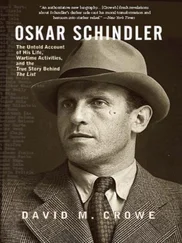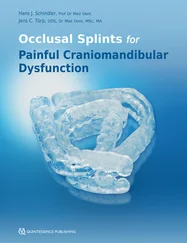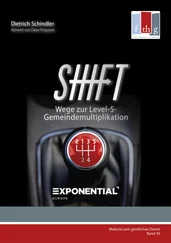“We’ve already lost two dozen people,” said Pfefferberg. “We have another fifty isolated in the cellar.”
This claim seemed to impress the gentlemen of the death’s-head. They were tired. They were fleeing. That was enough for them. They didn’t want any bacterial perils on top of the others.
When the gasoline arrived in 5-gallon cans, they expressed their thanks, bowed, and left through the gate. The prisoners watched them fill their tanks and considerately leave by the wire any cans they could not fit into their sidecars. They put on their gloves, started their engines, and left without too much revving of the motors, being too careful to waste their new tankfuls on flourishes. Their roar faded southwest through the village. For the men at the gate, this polite encounter would be their last with anyone wearing the uniform of Heinrich Himmler’s foul legion.
When on the third day the camp was liberated, it was by a single Russian officer. Riding a horse, he emerged through the defile through which the road and the railway siding approached the Brinnlitz gate. As he drew closer it became apparent that the horse was a mere pony, the officer’s thin feet in the stirrups nearly touching the road and his legs bent in comically underneath the horse’s skinny abdomen. He seemed to be bringing to Brinnlitz a personal, hard-won deliverance, for his uniform was worn, the leather strap of his rifle so withered by sweat and winter and campaigning that it had had to be replaced by rope. The reins of the horse were also of rope. The officer was fair-complexioned and, as Russians always look to Poles, immensely alien, immensely familiar.
After a short conversation in hybrid Polish-Russian, the commando at the gate let him in. Around the balconies of the second floor, the rumor of his arrival spread. As he dismounted he was kissed by Mrs. Krumholz. He smiled and called, in two languages, for a chair. One of the younger men brought it.
Standing on it to give himself a height advantage which, in relation to most of the prisoners, he did not need, he made what sounded like a standard liberation speech in Russian. Moshe Bejski could catch its gist. They had been liberated by the glorious Soviets. They were free to go to town, to move in the direction of their choosing. For under the Soviets, as in the mythical heaven, there was neither Jew nor Gentile, male nor female, bond nor free. They were not to take any cheap revenge in the town. Their Allies would find their oppressors, and subject them to solemn and appropriate punishment. The fact of their freedom should, to them, outweigh any other consideration.
He got down from his chair and smiled, as if saying that now he had finished as a spokesman and was prepared to answer questions. Bejski and some of the others began to speak to him, and he pointed to himself and said in creaky Belorussian Yiddish—the sort you pick up from your grandparents rather than your parents —that he was Jewish.
Now the conversation took on a new intimacy.
“Have you been in Poland?” Bejski asked him. “Yes,” the officer admitted. “I’ve come from Poland now.”
“Are there any Jews left up there?”
“I saw none.”
Prisoners were crowding around, translating and relaying the conversation to one another. “Where are you from?” the officer asked Bejski.
“Cracow.”
“I was in Cracow two weeks ago.”
“Auschwitz? What about Auschwitz?”
“I heard that at Auschwitz there are still a few Jews.”
The prisoners grew thoughtful. The Russian made Poland sound like a vacuum now, and if they returned to Cracow they’d rattle around in it bleakly like dried peas in a jar.
“Is there anything I can do for you?” the officer asked.
There were cries for food. He thought he could get them a cartload of bread, and perhaps some horsemeat. It should arrive before dusk. “But you should see what they have in town here,” the officer suggested.
It was a radical idea—that they ought to just go out the gate and begin shopping in Brinnlitz. For some of them it was still an unimaginable option. Young men like Pemper and Bejski pursued the officer as he left. If there were no Jews in Poland, there was nowhere to go. They didn’t want him to give them instructions, but felt he ought to discuss their quandary with them. The Russian paused in untying the reins of his pony from a railing.
“I don’t know,” he said, looking them in the face. “I don’t know where you ought to go. Don’t go east—that much I can tell you. But don’t go west either.” His fingers returned to untying the knot. “They don’t like us anywhere.”
As the Russian officer had urged them, the Brinnlitz prisoners moved out the gate at last to make their first tentative contact with the outer world. The young were the first to try it. Danka Schindel went out the day after the liberation and climbed the wooded hill behind the camp. Lilies and anemones were beginning to bud, and migratory birds were arriving from Africa. Danka sat on the hill for a while, savoring the day, then rolled down it and lay in the grass at the bottom, inhaling the fragrances and looking at the sky. She was there for so long that her parents presumed she had come to grief in the village, with either the townspeople or the Russians.
Goldberg left early too, was perhaps the first to go, on his way to pick up his riches in Cracow. He would emigrate, as quickly as he could arrange it, to Brazil.
Most of the older prisoners stayed in camp.
The Russians had now moved into Brinnlitz, occupying as an officers’ quarters a villa on a hill above the village. They brought to the camp a butchered horse, which the prisoners ate ravenously, some of them finding it too rich after their diet of bread and vegetables and Emilie Schindler’s porridge.
Lutek Feigenbaum, Janek Dresner, and young Sternberg went foraging in town. The village was patrolled by the Czech underground, and Brinnlitz folk of German descent were therefore wary of the liberated prisoners. A grocer indicated to the boys that they were welcome to a bag of sugar he’d been keeping in his storeroom. Young Sternberg found the sugar irresistible, lowering his face to it and swallowing it by the handful. It made him cruelly ill. He discovered what the Schindler group were finding in Nuremberg and Ravensburg—that liberty and the day of plenty had to be approached gradually.
The main purpose of this expedition to town had been to get bread. Feigenbaum was armed, as a member of the Brinnlitz commandos, with a pistol and a rifle, and when the baker insisted there was no bread, one of the others said to him, “Threaten him with the rifle.” The man, after all, was Sudetendeutsch and in theory an approver of all their misery. Feigenbaum pointed the weapon at the baker and moved through the shop into the residence beyond, looking for hidden flour. In the parlor, he found the baker’s wife and two daughters huddled in shock. They looked so frightened, indistinguishable from any Cracow family during an Aktion, that a great shame overwhelmed him. He nodded to the women as if he were on a social visit, and left.
The same shame overtook Mila Pfefferberg on her first visit to the village. As she entered the square, a Czech partisan stopped two Sudeten girls and made them take off their shoes so that Mila, who had only clogs, could select the pair that fitted her better. This sort of dominance made her flush, and she sat on the pavement making her embarrassed choice. The partisan gave the clogs to the Sudeten girl and passed on. Mila then turned in her tracks, ran up behind the girl, and gave the shoes back. The Sudetendeutscherin, Mila remembers, was not even gracious.
In the evenings, the Russians came to the camp looking for women. Pfefferberg had to put a pistol to the head of a soldier who penetrated the women’s quarters and grabbed Mrs. Krumholz. (Mrs. Krumholz would for years later chide Pfefferberg, pointing at him and accusing him. “Whatever chance I had of running off with a younger man, that scoundrel prevented it!”) Three girls were taken away—more or less voluntarily—to a Russian party, and came back after three days and, they claimed, a good time.
Читать дальше












